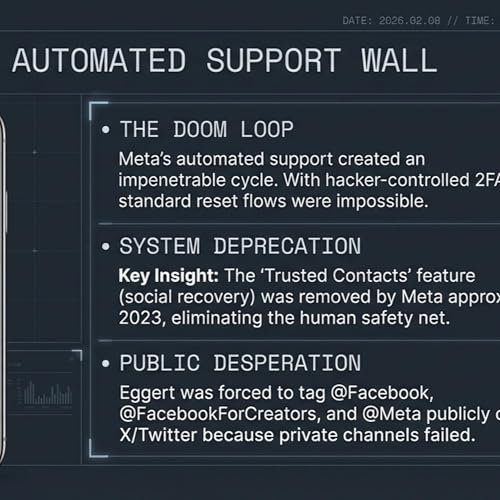What are the odds? No, seriously. Let’s run the numbers.What is the statistical probability that Nicole Eggert (Summer Quinn from Baywatch, the show watched by 1.1 billion people) gets hacked by a script kiddie named golpersacker?Now, what are the odds that the only person on Earth capable of stopping the permanent deletion of her cancer diaries is Alberto Daniel Hill—the first hacker ever imprisoned in Uruguay, a man whose cognitive processing is estimated in the top 0.1% of the human population (we don’t do numbers here, but think "Sherlock with a router"), and who just happens to be one of the 292 people Nicole follows on X?
In this episode of CyberMidnightClub, we deconstruct the "Baywatch Paradox."
The Plot:It starts not with a sophisticated SIEM alert, but with the "Mom Protocol." On February 6, 2026, Alberto’s mother (codename: Mama Cel2), who monitors his life via a fake X account, spots the hack on Facebook before Meta’s billion-dollar AI does.From there, it spirals into digital warfare.
- The Threat: A "Scorched Earth" attack. 30 days until total data deletion.
- The Strategy: Alberto launches the "Tri-Continental Pincer." He hits Meta with a consumer fraud complaint in California, a cybercrime investigation in Uruguay, and the nuclear option: GDPR Article 33 via his Italian citizenship, threatening a 4% global revenue fine.
- The Wildcard: When legal threats hit a wall, the hacktivist node SURGE (Anonymous) enters the chat, tracking the hacker’s Xbox UUIDs and "Chaos" boot service payments.
Why You Need to Listen:We break down the emails Meta ignored, the bluff that wasn't a bluff, and the psychological checkmate that forced a trillion-dollar company to bend the knee to a guy who once built a Nicole Eggert fan site on Geocities in 1996. (Synchronicity is a glitch in the matrix, folks).
Featured in this Episode:
- The "Mom Protocol": Why a Uruguayan mother on WhatsApp is faster than a SOC team.
- The 550 Error: How Meta’s legal team automated their own negligence.
- The David Bombal Connection: What it means when the guy from Darknet Diaries Ep. 25 stops playing nice.
- The "Golpersacker" Reveal: How we found the attacker playing Roblox.
Quote of the Night:"If you want to survive the AI apocalypse, don't rely on customer support. Make friends with a hacker... because the algorithm won't care. But the guy you DM'd in 2019 might just burn the world down to get your photos back."
Tags: #CyberSecurity #Hacking #NicoleEggert #Baywatch #Meta #GDPR #Anonymous #DarknetDiaries #AlbertoDanielHill #CyberMidnightClub #Synchronicity
[Visual Assets for the Studio Overlay]
- Image 1: High-contrast split screen: Nicole Eggert in the red swimsuit vs. a pixelated Matrix-green command prompt.
- Image 2: Screenshot of the WhatsApp from "Mama Cel2" with a red "DEFCON 1" stamp.
- Image 3: The "Social Graph" web showing the single glowing line connecting Alberto to Nicole.
- Image 4: The "Game Over" screen for golpersacker with the Anonymous mask overlay.
EPISODE TITLE: The Baywatch Paradox: How a Uruguayan Hacker, His Mother, and Anonymous Saved a Celebrity’s Soul
 29 分
29 分 9 分
9 分 16 分
16 分 30 分
30 分 7 分
7 分 34 分
34 分 2025/12/277 分
2025/12/277 分 2025/12/277 分
2025/12/277 分
